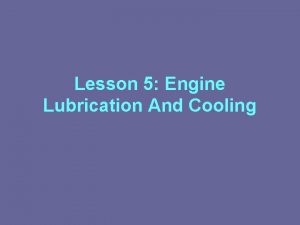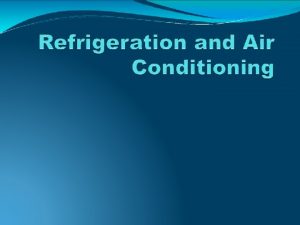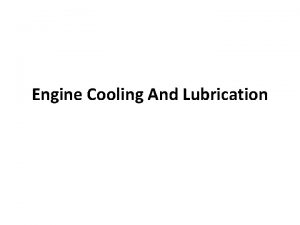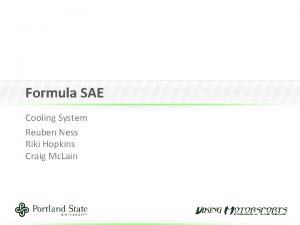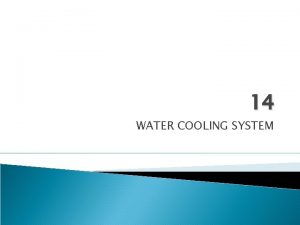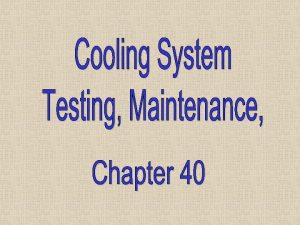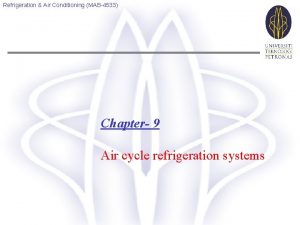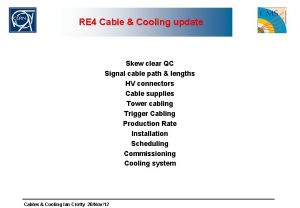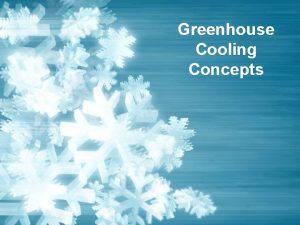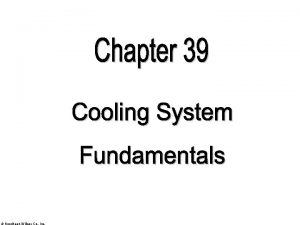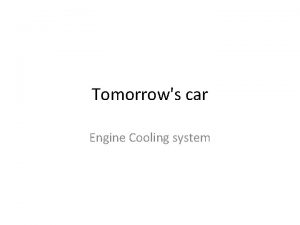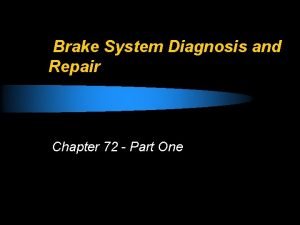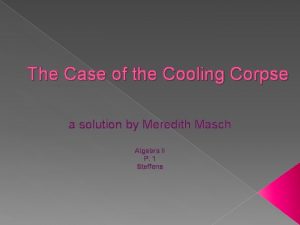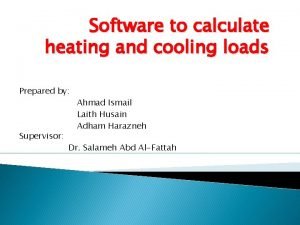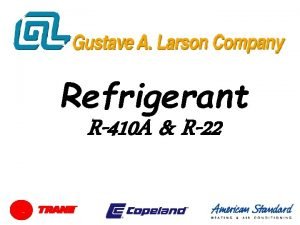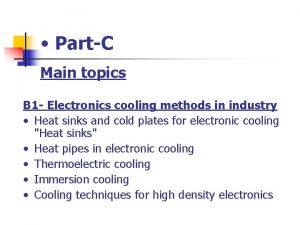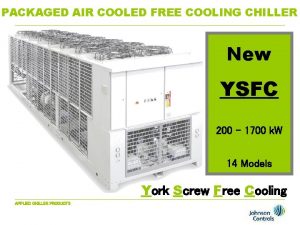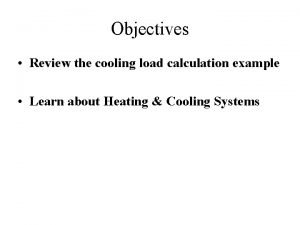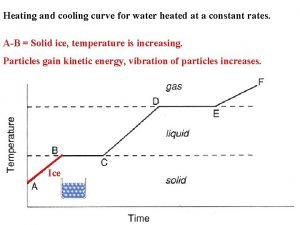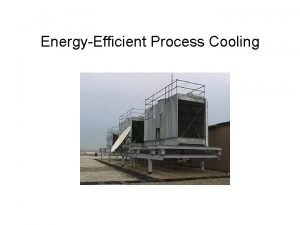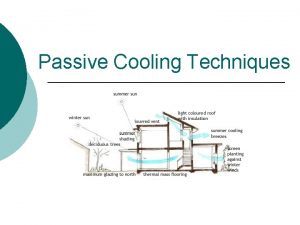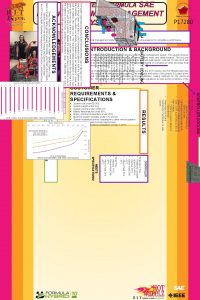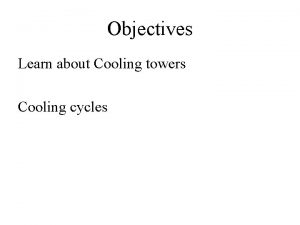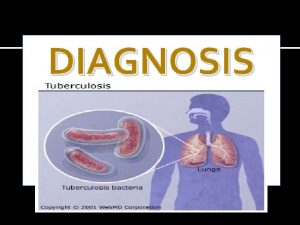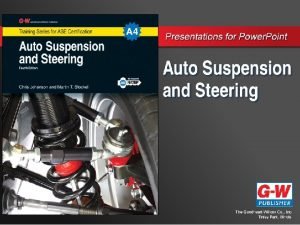GoodheartWillcox Co Inc Cooling system diagnosis Cooling system










































- Slides: 42

© Goodheart-Willcox Co. , Inc.

§ § § § Cooling system diagnosis Cooling system problems Thermostat service Cooling system hose service Radiator and pressure cap service Fan belt service Coolant service Flushing a cooling system © Goodheart-Willcox Co. , Inc.

§ Gather information: § talk to the owner or service writer to find out as much as possible about the symptoms § diagnosis charts in the service manual can be very helpful © Goodheart-Willcox Co. , Inc.

On-Board Diagnostics § Cooling-related problems may set a diagnostic trouble code on some systems § § © Goodheart-Willcox Co. , Inc. use a scan tool to analyze the system MIL lamp may be on data will indicate engine temperature even failure to bleed a system of air could cause erratic temperature sensing

Inspecting Cooling System § Perform a visual inspection for: § § § § © Goodheart-Willcox Co. , Inc. coolant leaks loose or missing fan belts low coolant level water pump noises plugged radiator fins coolant in the oil (oil looks milky) combustion leakage into coolant

Common Problems © Goodheart-Willcox Co. , Inc.

§ Coolant leaks § Overheating § Overcooling © Goodheart-Willcox Co. , Inc.

Coolant Leaks § External leaks § most common § show up as wet, discolored areas on parts § Internal leaks § caused by cracked block, head or blown head gasket © Goodheart-Willcox Co. , Inc.

Cooling System Problems A blown head gasket can allow combustion gases to enter the coolant © Goodheart-Willcox Co. , Inc.

Cooling System Problems Mineral deposits in water jackets can prevent proper heat transfer © Goodheart-Willcox Co. , Inc.

Cooling System Problems A cracked part or blown gasket can allow coolant to leak into the engine oil © Goodheart-Willcox Co. , Inc.

Cooling System Pressure Test § Low air pressure is forced into the system § causes coolant to pour or drip from any leak § Install pressure tester on filler neck § Pump the tester to pressurize system § Maximum 14 psi, (96 k. Pa) or cap rating © Goodheart-Willcox Co. , Inc.

Cooling System Pressure Test © Goodheart-Willcox Co. , Inc.

Combustion Leak Test § Checks for the presence of combustion gases in the coolant § Place combustion leak tester on filler neck § Start engine and squeeze tester bulb, pulling air through test fluid § If combustion gases are present in the radiator, fluid changes color © Goodheart-Willcox Co. , Inc.

Combustion Leak Test Combustion leakage can make the engine overheat © Goodheart-Willcox Co. , Inc.

Causes of Overheating § § § § Low coolant level Rust or scale accumulation in water jacket Stuck thermostat Delayed ignition Loose fan belt Bad water pump or collapsed lower hose Missing fan shroud or fan problems Causes of Overcooling §Stuck thermostat (open) §Locked fan clutch §Shorted fan switch © Goodheart-Willcox Co. , Inc.

§ A bad pump may leak, fail to circulate coolant, or produce a grinding sound § Causes: § rust in the cooling system § lack of coolant § overtightened belts © Goodheart-Willcox Co. , Inc.

§ A stuck thermostat can cause engine overheating or overcooling § Stuck open–overcooling § loss of efficiency, power, mileage § high emissions § Stuck closed–overheating § engine damage © Goodheart-Willcox Co. , Inc.

Thermostat Testing § Watch the coolant through the opening in the radiator neck § Cold engine, coolant should not flow § Hot engine, coolant should begin to circulate past the opening § Use a digital thermometer to monitor the temperature of thermostat housing © Goodheart-Willcox Co. , Inc.

Thermostat and Housing © Goodheart-Willcox Co. , Inc.

Thermostat Replacement © Goodheart-Willcox Co. , Inc.

Thermostat and Housing Special O-ring seal should be replaced anytime thermostat is removed © Goodheart-Willcox Co. , Inc.

Bleeding the Cooling System § A bleed valve is sometimes provided § Cars with low hood lines require a bleed screw to empty air pockets § Trapped air can cause overheating or damage from hot spots (buildup of heat) © Goodheart-Willcox Co. , Inc.

Bleeding the Cooling System § Fill the system § Start and warm the engine § Crack open the bleed screw until all air is purged from the system § NEVER remove a cooling system bleed screw or any clamp on a hot, pressurized system!!! © Goodheart-Willcox Co. , Inc.

Bleeding the Cooling System © Goodheart-Willcox Co. , Inc.

Common Hose Problems Hoses deteriorate and become soft and mushy or hard and brittle © Goodheart-Willcox Co. , Inc.

Hose Replacement A. Loosen clamp, twist and pull hose off B. Clean fitting C. Install new hose and clamp, check for leaks © Goodheart-Willcox Co. , Inc.

© Goodheart-Willcox Co. , Inc.

Inspecting the Radiator and Pressure Cap § Inspect radiator fins for debris and rot § Make sure the shroud is in place § Perform pressure cap test § measures cap opening pressure § checks sealing washer condition © Goodheart-Willcox Co. , Inc.

Pressure Testing a Radiator Cap © Goodheart-Willcox Co. , Inc.

Radiator Removal © Goodheart-Willcox Co. , Inc.

§ A loose fan belt will slip and squeal § may cause overheating § Inspect the condition and tension § Use a belt tension gauge to adjust belts § A faulty fan cause overheating, overcooling, vibration and water pump damage § Check for bent blades, cracks or fluid leakage © Goodheart-Willcox Co. , Inc.

Coolant should be checked and changed at regular intervals § Breaks down and becomes acidic § Rust preventative properties are lost © Goodheart-Willcox Co. , Inc.

Changing Coolant © Goodheart-Willcox Co. , Inc.

Checking Coolant Level Coolant should be even with correct marking on reservoir © Goodheart-Willcox Co. , Inc.

Checking Coolant Level Coolant should be 1” below the top of the tank © Goodheart-Willcox Co. , Inc.

Testing Coolant Strength § Measures the concentration of antifreeze compared to water § Determines freeze protection § Tool used: § cooling system hydrometer © Goodheart-Willcox Co. , Inc.

Hydrometer When filled, pointer will float to indicate freeze protection © Goodheart-Willcox Co. , Inc.

§ Cleans rust and scale from the system § May involve running a cleaning chemical through the system § Three Methods: § 1. fast flushing § 2. reverse flushing § 3. chemical flushing © Goodheart-Willcox Co. , Inc.

1. Fast Flushing © Goodheart-Willcox Co. , Inc.

2. Reverse Flushing © Goodheart-Willcox Co. , Inc.

3. Chemical Flushing § Used when scale buildup is causing overheating § Chemical cleaner is added to the coolant § Engine is operated for a specific amount of time § System is flushed with water © Goodheart-Willcox Co. , Inc.
 5 phases of the nursing process
5 phases of the nursing process Medical diagnosis and nursing diagnosis difference
Medical diagnosis and nursing diagnosis difference Medical diagnosis and nursing diagnosis difference
Medical diagnosis and nursing diagnosis difference Objectives of nursing process
Objectives of nursing process Perbedaan diagnosis gizi dan diagnosis medis
Perbedaan diagnosis gizi dan diagnosis medis Advanced cooling systems inc
Advanced cooling systems inc Engine lubrication and cooling system
Engine lubrication and cooling system Introduction of refrigeration system
Introduction of refrigeration system Ess cooling system
Ess cooling system Ess cooling system
Ess cooling system Splash lubrication system
Splash lubrication system Solar cooling system
Solar cooling system Fsae cooling system
Fsae cooling system Jacket water cooling system treatment
Jacket water cooling system treatment Cooling system diagnostic
Cooling system diagnostic Cop in refrigeration
Cop in refrigeration Lan closet
Lan closet Plasticavi
Plasticavi Thermosyphon cooling system design
Thermosyphon cooling system design Roman cooling system
Roman cooling system Convection tube cooling in greenhouse
Convection tube cooling in greenhouse Engine cooling system
Engine cooling system Smart car cooling system
Smart car cooling system Dtm cooling system
Dtm cooling system Peas agent
Peas agent Chapter 81 brake system technology answers
Chapter 81 brake system technology answers Chapter 76 suspension system diagnosis and repair answers
Chapter 76 suspension system diagnosis and repair answers Brake pedal reserve distance
Brake pedal reserve distance Peas for medical diagnosis system
Peas for medical diagnosis system Peas for interactive english tutor
Peas for interactive english tutor Peas automated taxi driver
Peas automated taxi driver Agent function vs agent program
Agent function vs agent program Dr dedman math problem
Dr dedman math problem Liz owns stock in nar heating/cooling and cilla shipping
Liz owns stock in nar heating/cooling and cilla shipping Heating and cooling software
Heating and cooling software R22 temp pressure chart
R22 temp pressure chart Electronic cooling methods
Electronic cooling methods Free cooling chiller
Free cooling chiller Immersion cooling case
Immersion cooling case Ocp liquid cooling
Ocp liquid cooling Cooling load calculation sample problems
Cooling load calculation sample problems His cart might be a flower bed
His cart might be a flower bed Heating and cooling curve
Heating and cooling curve






